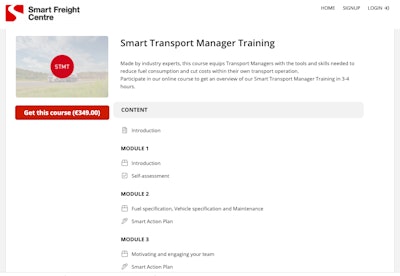In partnership with global non-profit Smart Freight Centre, Shell Lubricants is sponsoring the delivery of the sustainable freight expert’s Smart Transport Manager Training (STMT).
Initially available online, the training program is designed to educate fleet managers on how best to reduce carbon emissions, increase efficiencies and cut costs throughout their entire supply chain. The goal is to expand the offering to include in-person training, but these plans are currently on hold due to the pandemic.
To date, fleet managers that have implemented some of the measures have reported a 5% to 20% improvement in fuel efficiency and reduced fleet operating costs.
 To date, fleet managers that have implemented some of the measures have reported a 5% to 20% improvement in fuel efficiency and reduced fleet operating costs.
To date, fleet managers that have implemented some of the measures have reported a 5% to 20% improvement in fuel efficiency and reduced fleet operating costs.“When it comes to the transport industry – where emissions are increasingly being placed under the microscope – sustainability begins with fleet managers, said Troy Chapman, Shell Lubricant Solutions Vice President of Global Marketing B2B & OEM Lubricants. “Recent Frost & Sullivan research shows that 70% of fleets are committed to forwarding sustainability goals, and we believe that STMT can help to provide the platform for them to do so”
The program has been assembled by industry experts and covers five modules over a four-hour online course. Modules educate fleet managers on the latest methodologies and technologies offered to motor carriers, providing them with the theoretical knowledge needed, as well as an individualized Smart Action Plan to help implement the ideas.
Shell contributed examples of lower viscosity engine oils that provide a fuel economy benefit, which helped inform the course modules.
“The support of Shell Lubricants for our Smart Transport Manager Training allows us to reach an even bigger market and help to reduce GHG emissions in the road freight industry,” said Smart Freight Centre Business Development Manager Bonne Goedhart. “This is vital because road freight contributes to 62% of logistics GHG emissions. We need to act now. For Smart Freight Centre, it is important that all players in the global freight sector work together towards zero emissions by 2050.”
Commercial road freight’s share of total international trade-related emissions is projected to grow from 53% in 2010 to 56% by 2050, according to the International Transport Forum. To reduce this, in line with international climate agreements and Shell’s own effort to become a net-zero energy supplier by 2050, more must be done to encourage industry partners and clients to enact more effective sustainability measures. Through a range of related topics – from fuel and lubricant choice to performance monitoring – STMT aims to accelerate knowledge sharing and technology dissemination, helping to achieve Smart Freight Centre’s goal of reducing the carbon emissions of multinationals and logistics specialists across the globe.
Shell’s Global Marketing Manager of the On-Highway Fleet Sector Jeff Priborsky noted fleets are under growing pressure to decarbonize, but business and operational goals haven’t changed.
“So they want to know how sustainability can be achieved without compromising performance,” he said. “We know the pressures that fleet managers are faced with in this current social and legislative climate, and so STMT is a means of helping them to fulfill their financial and performance-related responsibilities, while also contributing to the larger aim of developing a more sustainable industry environment.”
The online modules of STMT are currently available for fleet managers worldwide, with the rollout of in-person training across the EU and U.S. set to follow in the coming year. Online modules will cover:
- Fuels and lubricants: How fuel and lubricants choice can influence emissions and costs.
- Drivers: How fleets and drivers can change their behavior to radically reduce emissions, fuel costs and even maintenance requirements.
- Vehicles: How fleets can maximize utilization and minimize emissions by choosing exactly the right vehicle type for the task at hand.
- Performance monitoring: How fleets can accurately measure and track their emissions using the right tools and a robust and consistent methodology.
- Information technology: How fleets can reduce their environmental impact and overheads using telematics, onboard monitoring and other technologies.











